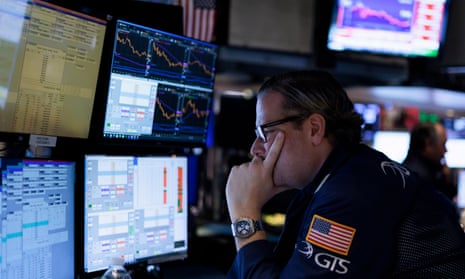Central banks on both sides of the Atlantic are facing one of the toughest calls on interest rates in years, as concerns over the worst banking crisis since 2008 cast doubt on the need for further action to reduce sky-high inflation.
Financial markets expect the US Federal Reserve to raise its main rate by 0.25 percentage points on Wednesday, down from predictions just two weeks ago for the US’s central bank to increase borrowing costs by twice that amount.
City traders said a rate decision from the Bank of England on Thursday was also on a knife-edge, as concerns mounted over the health of the banking system after the failure of Silicon Valley Bank and the Swiss government-brokered rescue of Credit Suisse.
Trading in financial markets suggests an almost 50-50 chance that the UK central bank leaves interest rates on hold, which would bring to a standstill one of the most aggressive assaults on inflation for decades after 10 successive rate hikes since December 2021.
“These events put central banks in an even tougher spot now,” said CJ Cowan, a portfolio manager at Quilter Investors. “Financial stability concerns have resurfaced but inflation still remains uncomfortably high and is showing signs that it won’t fall as far or as fast as hoped.”
Some economists said the Fed should keep interest rates on hold, while David Blanchflower, a member of the Bank’s monetary policy committee during the 2008 financial crisis, urged the UK central bank to slash rates and stop selling government bonds to shore up the economy.
In a fortnight invoking memories of the 2008 banking crash, financial market expectations for significant further rate increase have cooled. Goldman Sachs said the Fed could hold rates at the current level of 4.5% to 4.75%, after previously expecting another rise.
Before the failure of SVB, a rate increase of 0.5 percentage points had been expected in financial markets, after the Fed chair, Jerome Powell, said more increases would be needed to cool inflation.
However, some City economists said financial stability concerns amid the recent market turmoil could lead banks to be more cautious about issuing loans, with the same effect as higher borrowing costs.
Others said the Fed holding back could send a worrying signal on its view of the severity of the banking crisis. Earlier this week, the European Central Bank pressed ahead with a 0.5 percentage point increase, despite speculation that fears of financial instability could have forced a smaller rise.
Kristina Hooper, chief global market strategist at Invesco, said: “If this was a systemic crisis, the ECB would not have hiked rates 50 basis points last week.”
Faced with the risk of a fast-moving loss of confidence, the world’s most powerful central banks announced coordinated action on Monday to support the flow of cash in the financial system, a decision some analysts said could help to address fears over banking sector stability without the need to cut short their interest rate hikes.
after newsletter promotion
The market turbulence comes as several members of the Bank of England’s rate-setting monetary policy committee have argued the central bank should stop raising rates amid concern over the health of the economy, and as the delayed impact from previous increases hits households and businesses.
Official figures on Wednesday are expected to show that inflation cooled again in February for the fourth month running, with potential to ease some of the pressure on the Bank to raise rates.
The Resolution Foundation said there were signs that wage growth in the UK had stalled since November, suggesting that the Bank’s rate-setters should worry less about wage-led inflation pressures.
Charlie McCurdy, an economist at the Resolution Foundation, said: “Discussion of whether the central bank has one final rate rise in it before pausing have focused on whether the Bank’s hand will be stayed by the instability we are seeing playing out in the banking sector from Silicon Valley to Switzerland.
“But in the UK specifically, something else should be more material to the MPC’s decisions – something that has gone entirely unnoticed. Wage growth has ground to a halt. Private sector pay, far from spiralling, has instead flatlined since November. The future path of wages in Britain remains very uncertain, but looking back over recent months the picture is very different from that often presented.”
